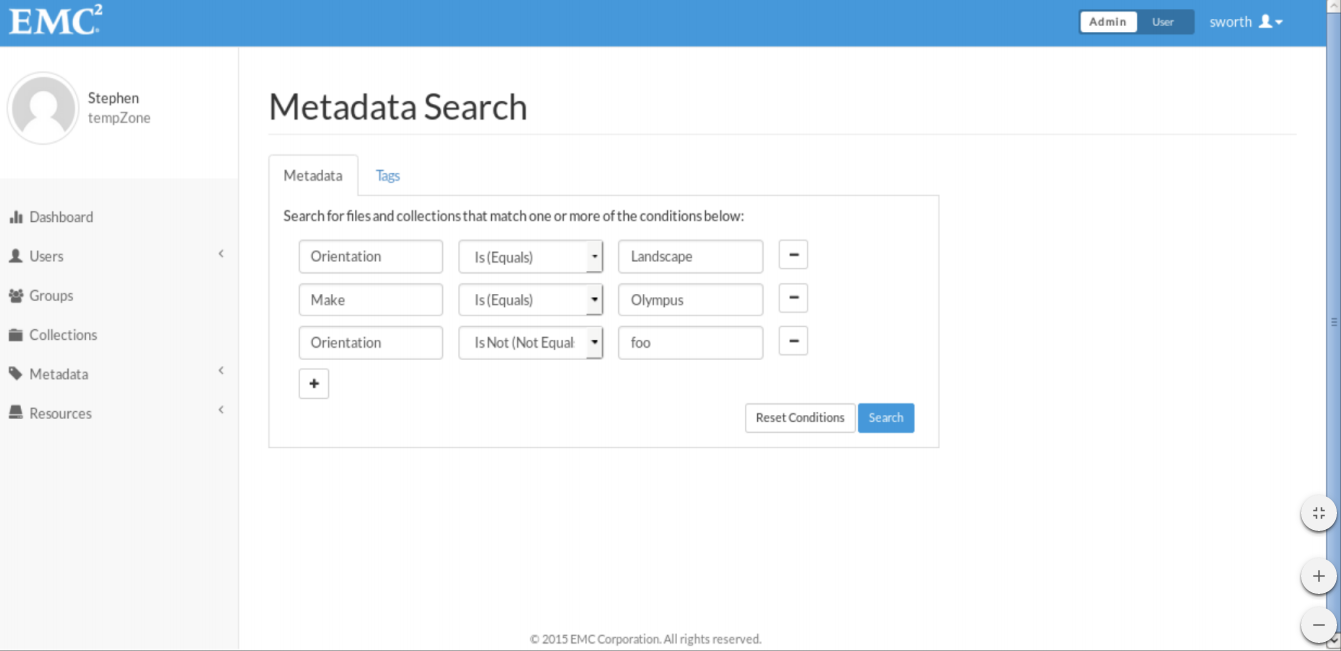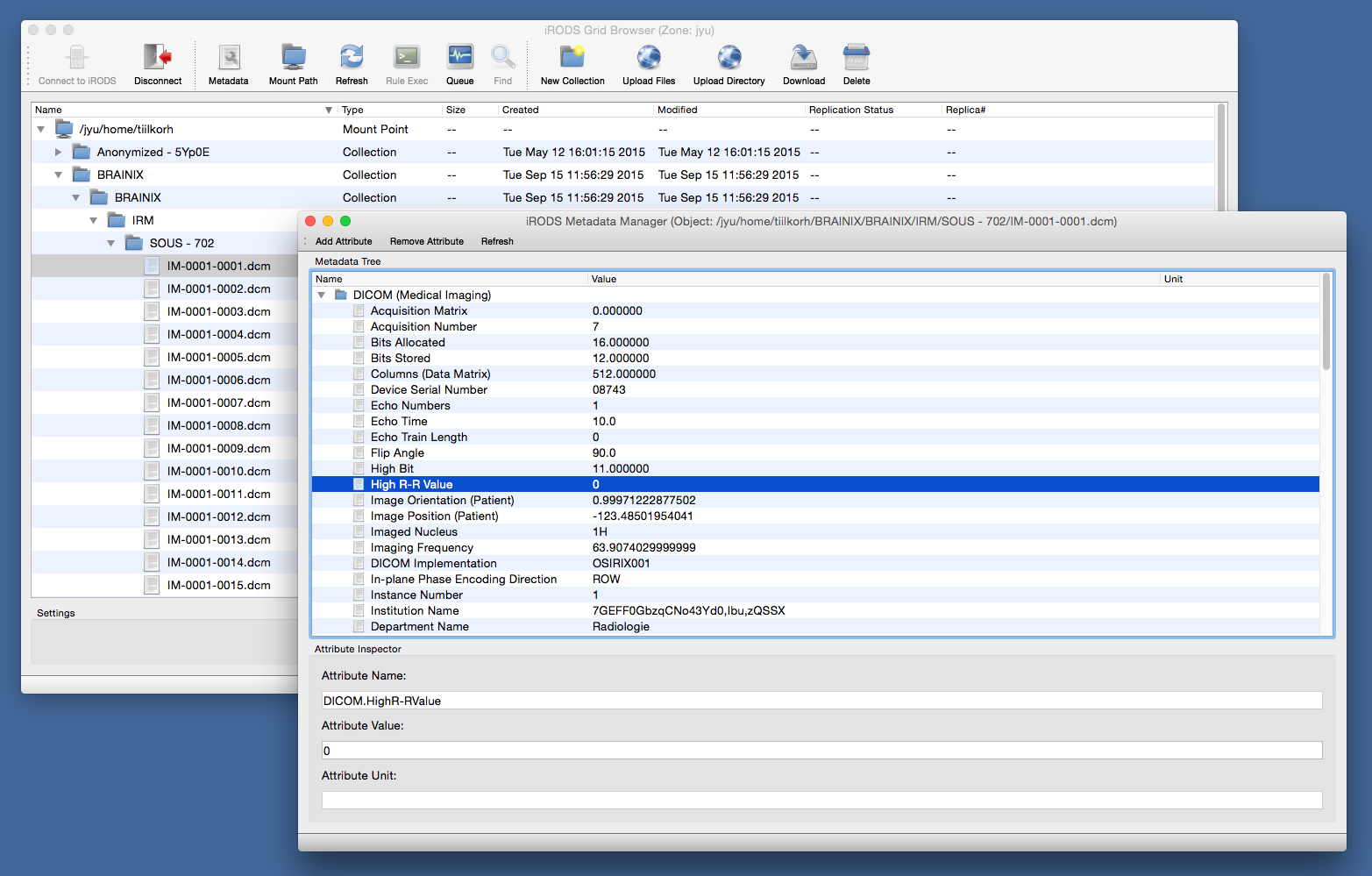Update: iRODS Client Interfaces
A lot has changed since this July 2014 post about iRODS User Interfaces. I've been meaning to update this for some time. So, without further ado, I'm going to list as many iRODS client interfaces as I can think of.
Want to test out any of these interfaces?Contact us to schedule a demonstration or to get connected with the software development team.
Web-Based Graphical Clients
Cloud Browser, MetaLnx, and the iPlant Discovery Environment
One of our founding members, the DICE Group, has just released Cloud Browser 1.0, a web-based GUI for managing iRODS collections, transferring files to and from collections, annotating files and collections with metadata, and more. Cloud Browser is available from DICE-UNC on Github.

Another of our long-standing members, EMC Corporation, has developed MetaLnx, a web-based GUI that adds metadata search and administrative capabilities to iRODS file management. Administrative features include server health checks, a user account directory, and permission management. MetaLnx is available for beta testing through EMC. Contact us for a demo and to get in touch with EMC.

The iPlant Discovery Environment (DE) isn't just an iRODS client: it's a graphical workspace that allows users to find data and process it on cloud-based high performance computing (HPC) resources. Through the NSF-funded DataNet Federation Consortium (DFC), the DICE group is working with the iPlant Collaborative to package and deploy new instances of the Discovery Environment. You can get a DE account right now at https://de.iplantcollaborative.org
Desktop Graphical Clients
Kanki and Cyberduck
Kanki is a Qt-based iRODS client developed by Ilari Korhonen at University of Jyväskylä, Finland. One thing we've noticed about Kanki: it's FAST. That is, it's very responsive. In addition to file and collection management, it also has advanced features like metadata templating; metadata search is currently in beta, but already usable. Ilari has written a blog post for us where he explains how to install Kanki on a Mac. Kanki is an open source project on Github.

Cyberduck is a popular file transfer client that speaks to a host of systems, including FTP/SFTP, Amazon S3, Swift, and now iRODS. iRODS support is thanks to the efforts of the iPlant Collaborative, the DICE Group, and the Cyberduck development team. More information is available in a blog post and from Cyberduck.io.
Network File System Interfaces
WebDAV and FUSE
Mike Conway from the DICE Group has developed a WebDAV client for iRODS, based on the Milton.io WebDAV framework. WebDAV support is built in to Windows, MacOSX, and Linux, making it possible to drag and drop files from your computer into iRODS collections. Detailed installation instructions are available in a blog post, and the project is in Github.
The FUSE iRODS client lets you mount your iRODS home collection as a file system on Linux or MacOSX. Details are in Github, and the FUSE client is included in the iRODS iCommands distribution, which can be downloaded at https://irods.org/download/.
Parrot is a program that can "wrap" another program, trap file system accesses (reads/writes), and direct those accesses to iRODS or another protocol. This allows you to use iRODS as the storage backend for almost any program without re-writing, re-linking, or re-installing. Parrot is part of the Cooperative Computing Tools Suite (cctools) from the Cooperative Computing Lab at Notre Dame. The cctools suite is available on Github.
Command-Line Interfaces
iCommands and Baton
iCommands are command line executables that ship with iRODS. The iadmin command is used to perform a number of administrative activities. Many of the other iCommands are analogs to UNIX command line activities. iput and iget are used to add and retrieve data to and from collections; icd is used to navigate collections. imeta and iquest are used to manage and querying metadata. iCommands are installed automatically on a server install. We also provide an iCommands package for several Linux flavors on the download page, and instructions are available for building iCommands on MacOSX (part of the Kanki build instructions). iCommands documentation is at our documentation site docs.irods.org.
Consortium member the Wellcome Trust Sanger Institute has developed Baton, a set of command line tools and an API made to ease programmatic access to iRODS. Baton provides detailed file and collection management with JSON-formatted listings, as well as a simplified metadata query API, also with JSON-formatted responses. Baton is open source software, available on Github.
APIs
R, REST, Java, Python, Qt, C++
We have built an iRODS R Client based on the REST API.
The REST API from the DICE Group provides http-based access to iRODS data and metadata. It is based on Jargon.
Jargon from the DICE Group is the Java API for iRODS, which provides extensive access to iRODS facilities.
The iRODS Python API provides access to data; user, permission, and storage resource, management; and metadata queries through Python.
QRODS is a Qt API for iRODS from the MoDCS Research Group at Universidade Federal de Pernambuco, Brazil. QRODS exposes file transfers to/from iRODS, collection management, and metadata management in iRODS.
The iRODS C++ API is built into iRODS. The client API test functions provide some examples of how to use the C++ API.
Are there more? Probably. Keep an eye on iRODS Hub for fresh interfaces as they become available. iRODS Hub is the place to link to clients, rules, dockerfiles, and other software developed for iRODS.
Thank you. I can't wait to see the how this list grows over the next year.
Dan Bedard